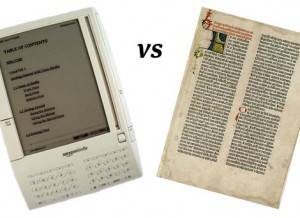 |
The I -pad and Kindle are slowly replacing books and "printed"
material . You should be concerned, |


Fahrenheit 451
is a dystopian novel by Ray Bradbury. The novel presents a future American society where books are outlawed and firemen burn any house that contains them.[1] It may NOT be fiction. Is there some kind of "conspiracy" to do away with all printed material ? . MAYBE NOT but in the digital age anything can be at risk . Recently Newsweek, one of the most internationally recognized magazine brands in the world, will ceased publishing a print edition after nearly 80 years. The term Ceased may be just a step into oblivion . I had a subscription to the magazine for years . I was irate with the decision because I feel that the Printed word in it's original form constitutes a way better method in reaching people . Conversion to digital means that people working the presses at Newsweek would be laid off . The Editor of Newsweek may have kicked the can for the end of "Printed Material" .All this is going to do is make Newsweek much easier to ignore. If they were losing readers before, just wait until the only people who can read it are those with computers or tablets.Once it disappears from newsstands, people will simply assume it went out of business They won't bother looking it up online. They'll just shrug and buy Time instead.Wondered where US News and World Report had gone . Now, with this one missing, what in the world shall we read at the dentist or doctors offices? Already, it appears that cooking, race car, or movie/tv star magazines have taken over there. Its a shame that print is disappearing. Are the doctors going to provide us with a tablet in their office? The crazy thing about this that converting printed material into digital has something to do with 'environmentalism' . I am sure that it's part of going green , and replacing books . It's also a vary cheap way of communicating with out copyright safety guards on electronic printed material . What digital conversions do in effect they make objects printed on paper become vary expensive if not a rarity .The really sad thing about this is that 20 years from now are we still going to have access to the "copies" we purchased? Will we be able to download them and keep them for posterity? There's something about holding a physical magazine or book in your hands, flipping through the pages back and forth - ripping out pages with recipes or interesting articles. I've been known to hold on to copies of magazines for YEARS so I could flip through at any time. I'm not going to waste money on a magazine if I can't "keep" a "copy" of it.
NOTES AND COMMENTS:
Next Month Social Security checks will also go 'digital' in a way replacing the mailed check for seniors , yes it's called an electronic transfer . Easy said , they want to get rid of paper so the government would save a lot of trees . As curious as I am . I believe that soon the American Dollar will vanish because of environmental concerns . After all the government prints lots of money .
Another odd ball thing about the digitization of books, magazines . Public Schools are now pushing for electronic pads to replace books . For generations, school meant books -- lots of books. But not anymore. Around the country, from high school to grad school, textbooks are getting harder to find. Technology has made the library something that can fit into the palm of your hand.Unlike the tentative, incremental steps of digital initiatives at many schools nationwide, The transformation, which cost $1.1 million for infrastructure, involved rewiring not just classrooms but also the mindset of students, teachers and parents. When teachers started hearing that “the server ate my homework,” they knew a new era had begun.“This isn’t stressing out students,” said a teacher . “It’s stressing out teachers because of some of the technological problems, and parents who are wondering why their kids are on the computer so much.”


No comments:
Post a Comment